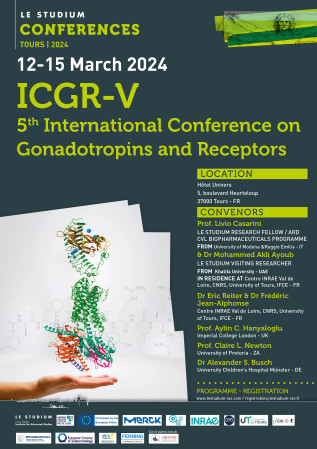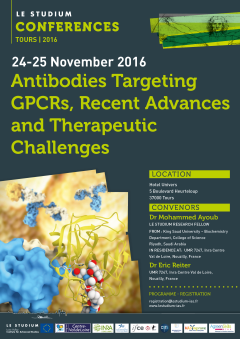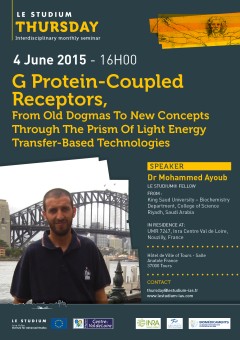Dr Mohammed Ayoub

From
Khalifa University, Biology Department, College of Arts and Sciences, Abu Dhabi - UAE
In residence at
Host scientist
Dr Frédéric Jean-Alphonse
BIOGRAPHY
Dr Mohammed Akli Ayoub is Associate Professor in Biology department at Khalifa University, Abu Dhabi, UAE. He obtained his PhD of Biochemistry and Molecular Biology in 2003 from the University of Paris (France). His main research focus is on the molecular pharmacology and signaling of cell surface hormone receptors including GPCRs and RTKs, and their implication in physiology and pathophysiology. He published more than 70 articles receiving more than 4300 citations with a strong international research experience in France, Australia, Saudi Arabia and UAE.
PROJECT (2023)
Investigating The Effects Of Steroid Hormones On G Protein-Coupled Receptors In Vitro
Steroid hormones (SH) are classically known to mediate delayed genomic effects through their intracellular/nuclear receptors. However, strong evidences have been accumulated in a favor of rapid non-genomic signaling of SH acting on specific cell surface receptors, including G protein-coupled receptors (GPCRs). In this project, we hypothesize that the receptors for two gonadotropins, follicle-stimulating and luteinizing hormones (FSH and LH), that play a pivotal role in human and animal reproduction, may constitute the interesting candidates. Indeed, FSHR and LHR are the key receptors used by FSH and LH, respectively, to mediate the production of sex hormones (testosterone, progesterone, and estrogen) in the gonads (testis and ovaries). Therefore, we speculate on the possible positive or negative feedback effects of these SH directly at the level of FSHR/LHR in the gonads. To investigate this, we propose to study the effects of various SH on the activity and the regulation of FSHR/LHR in two different cell lines, human embryonic kidney (HEK293) cells that transiently or stably express the receptors and the murine Leydig tumor (mLTC-1) cells endogenously expressing LHR. The pharmacological effects of SH will be examined using two different protocols in order to determine whether SH are activators (agonists) or allosteric modulators (positive or negative) of FSHR/LHR. Our study will shed more light on the physiological interactions between the gonadotropins and SH during the control of reproduction. Also, this should come up with pharmacological conclusions that will be useful to better understand and treat the reproductive disorders linked to SH and FSHR/LHR dysfunction.
PROJECT (2014 - 2016)
Development and characterization of a new generation of GPCR therapeutics.
This project aims to develop a new generation of therapeutics based on specific antibodies (nanobodies), which specifically modulate the function of G protein-coupled receptors (GPCRs). GPCRs currently accounts for 30 to 40% of the currently marketed drugs and are centrally involved in most physiological and pathological processes. This is an ambitious project to help build the outstanding scientific and technical environment necessary for the generation, functional screening and pharmacological profiling of various GPCR-selective nanobodies both in vitro and in vivo. Indeed, in order for the laboratory to succeed in this endeavour, it is crucial to be able to rely on the cutting-edge technologies in the field. Therefore, considerable effort will be devoted to develop and set up the new technologies and assays needed such as bioluminescence resonance energy transfer (BRET), homogeneous time-resolved fluorescence (HTRF), fluorescence, signaling assays and others. It will also be essential to address the different aspects of the project in the context of the newly emerged concepts in molecular pharmacology including heteromerization, multiple coupling, biased signalling…etc. Of course, this requires the appropriate expertise of the research staff as well as strong collaborations with many national and international academic and industrial laboratories. Importantly, at UMR 7247 PRC, the work will involve close collaboration between the BIOS and DRUGS research groups as well as with Synthelis, a biotech startup. Their collective expertise in GPCR pharmacology, molecular simulation and modelling, antibody generation and selection, GPCR expression, production and reconstitution in acellular systems is complementary and innovative. The ultimate objective being to develop novel drug candidates, so it is essential to setup the appropriate in vivo models. To address this need, the selected GPCR-modulating nanobodies are tested for their potential therapeutic action using various preclinical models established in collaborations with several research units within region Centre. This research project is imbedded in the activities of the MabImprove labex, which is devoted to therapeutic antibodies. This provides an outstanding research environment in the key domains such as immunology and antibody engineering.
Publications
Final reports
In this project, we investigated the pharmacological effects of steroid hormones on gonadotropin receptors, FSHR and LHR, transiently expressed in HEK293 cells. For this, we used BRET technology to assess receptor-G protein activation as well as -arrestin recruitment upon treatment of cells with gonadotropins, FSH or hCG, in the absence or presence of increasing doses of 3 different steroid hormones (SH), estradiol, testosterone, and progesterone. We observed that SH to different extent significantly modulate FSH/hCG-promoted BRET signals between receptor/G protein as well as receptor/-arrestin pairs. Tis indicate an allosteric mode of action of SH on FSHR and LHR. Moreover, we observed differential effects of SH on receptor/-arrestin pair when comparing FSHR and LHR by decreasing (for FSHR) or increasing (for LHR) the BRET responses. Interestingly, we also observed significant BRET increase with vasopressin (V2R) and angiotensin II (AT1R) receptors. This suggests a more general feature of SH allosterically targeting GPCRs with potential implications in physiology and pathophysiology.




